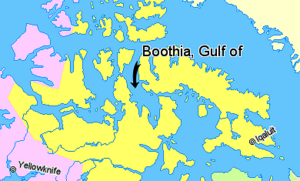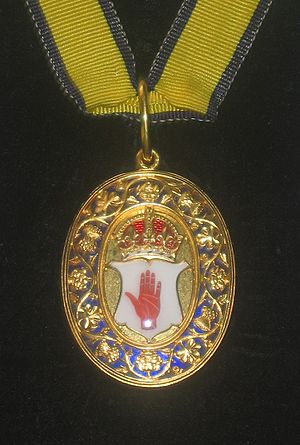Felix Booth facts for kids
Sir Felix Booth (born July 16, 1780, in Clerkenwell; died January 24, 1850, in Brighton) was a very rich British distiller. He made a type of alcohol called gin. Sir Felix was also a big supporter of exploring the Arctic, which is the cold northern part of the world. Many places in Nunavut, Canada, are named after him because of his help with these explorations.
Contents
Life and Business
Sir Felix Booth's family had a long history in England, going back many centuries. His family was involved in land ownership in places like Lancashire and Lincolnshire.
Sir Felix's grandfather, John Booth, moved to London and started a business making spirits. This business, which later became known as Booth's Gin, grew very popular. John's son, Philip Booth (Sir Felix's father), joined the family business around 1760. Philip and his wife, Elizabeth Walls, had seven children, and Felix was one of them.
Felix, along with his brothers William and John Gillyat, learned the family business. After his father passed away, Felix took full control of the company. He was very energetic and helped the business grow a lot. He built a second distillery in Brentford, near the River Thames, and bought a nearby brewery. He even opened a distillery in Scotland. This made him the owner of the biggest distilling business in Great Britain.
In 1828, when he was 48, Felix Booth became a Sheriff of the City of London. He had become very wealthy and decided to use his money to fund a special trip.
Arctic Exploration
Sir Felix Booth was very interested in science and exploration. He used his own money to pay for an expedition to the Arctic Seas. This journey was led by Captain John Ross in 1829. Captain Ross and his 22 companions sailed on a ship called the "Victory." They had enough supplies to last several years.
The expedition left England in May 1829 and returned in October 1833. Even though they didn't find the Northwest Passage, they explored and mapped a huge area of over 500,000 square miles. This greatly helped future explorers.
Because of Sir Felix Booth's generous financial help, the King honored him. He was made a baronet, which is a special title, as a reward for his "patriotism" in funding the Arctic expedition.
Many places in the Arctic were named after him by Captain Ross. These include the Boothia Peninsula, the Gulf of Boothia, Isthmus of Boothia, Continent of Boothia Felix, Felix Harbor, Cape Felix, and Sheriff's Harbor.
One of the most important discoveries during this expedition was finding the exact location of the North Magnetic Pole.
Later Life and Legacy
In 1832, Sir Felix Booth bought a site in London for his distillery. He also tried to make vinegar from leftover spirits, but this wasn't successful.
Later in his life, Sir Felix faced a legal challenge in court. He was found innocent. During this time, it was revealed that he had a son, John Marshall Marr, whom he had supported financially since childhood.
Sir Felix Booth died suddenly in 1850 at the age of 69. His funeral was a grand event, showing how much he was respected. People said he was a "princely citizen of London" who used his great wealth to help others. He was known for his kindness and generosity.
Sir Felix Booth never married. His son, John Marshall Marr, married Emma Minchin and had many children. John Marshall Marr received benefits from Sir Felix Booth's will.
The company, Booth's Gin, continued for many years but stopped making gin in 2017. The brand was later sold to another company.
Honors and Recognitions
Sir Felix Booth was a respected member of the London community. He served as an Alderman and was a leader of the Worshipful Company of Coopers, which was a guild for barrel makers. He was also elected Sheriff of London in 1828.
He was one of the first members of the Royal Geographical Society, which is a group for geographers and explorers. In 1834, he was also chosen as a Fellow of the Royal Society, a very prestigious group for scientists.
His title as a baronet was given to him in 1835 because he funded the successful Arctic expedition. After his death, his nephew, Sir Williamson Booth, became the 2nd baronet.
See also
- Booth baronets
- Booth's Gin
- Nunavut
 | William L. Dawson |
 | W. E. B. Du Bois |
 | Harry Belafonte |



